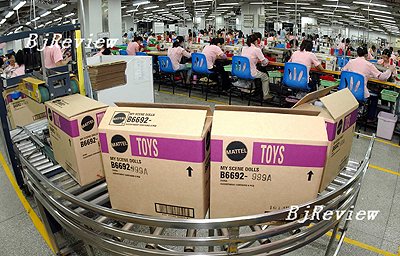
On July 23, the Ministry of Commerce and the General Administration of Customs (China Customs) jointly issued a notice that put restrictions on 1,853 exported products, involving plastic, furniture, textile and other labor-intensive industries. These products account for 15 percent of the country's total products for export.
Under the new policy, enterprises engaged in the production of these products are required to have guarantee deposits in the Bank of China, the designated bank of China Customs, while registering their processing trade contracts with the authorities.
The move is the second of a one-two punch against the surging trade surplus, closely following the decision by the Chinese Government to reduce tax rebates on a large number of exports.
Processing trade comprises half of all Chinese exports and is also the main source of the excessive surplus. Statistics from China Customs show that in 2006 the total import and export volume of the processing trade amounted to $831.9 billion, accounting for 47 percent of the total foreign trade volume. The trade surplus generated by the processing trade last year was $188.9 billion, surpassing the country's total trade surplus of $177.5 billion that year.
On June 19, the ministry announced that starting July 1 the country would cut or eliminate export tax rebates for 2,831 kinds of commodities representing 37 percent of the total number of items listed on customs tax regulations. The decision to eliminate the rebates is seen as a means to suppress overheated export growth and ease frictions between China and its trade partners.
After the move, many enterprises rushed to ship their products before the tax rebates were actually reduced.
In the first half of this year, the Chinese trade surplus jumped to $112.5 billion, up 83.1 percent compared with the same period last year.
Rising costs
Industrial insiders estimated that the export costs of some enterprises would rise 30 percent due to this round of restrictions. Small and medium-sized companies will suffer most, and it is increasingly difficult for them to sustain the added burdens.
Guangdong Province is a major processing trade hub of China, with the total volume accounting for one-fourth of the nation's total. Chan Wailun, a Hong Kong businessman, is engaged in the processing trade business in Guangdong, producing wooden toys and furniture. Chan said that Hong Kong and Taiwan businesspeople who have invested in the processing trade in Guangdong find it hard to accept the sudden termination of the processing trade era, which was once heavily promoted by the Chinese Government. He claims that the macro-control efforts of the Central Government are heavy enough that may add pressure to many enterprises for their subsistence.
Wang Qinhua, Director of the Bureau of Industry Injury Investigation of the Ministry of Commerce, stated in a press conference that the Chinese Government would adopt measures to help related Hong Kong companies to transform so that they can adapt to the mainland's new processing trade policies.
Structural optimization
Wei Jianguo, Vice Minister of Commerce, said the processing trade policy shift isn't meant to eliminate the processing trade, but to promote the sector's development in a sound way.
Wei said this round of policy change would help ease such problems as energy tension, environment pollution and resource depletion.
"It is in line with the countrys' overall socioeconomic development, and will help promote industrial restructuring, optimize the processing trade structure, improve the openness of China's central and western regions and achieve balanced development of foreign trade," said Wei. "We will continue to improve the categorization of the processing industry and set stricter entry standards for enterprises engaged in the processing trade."
| 